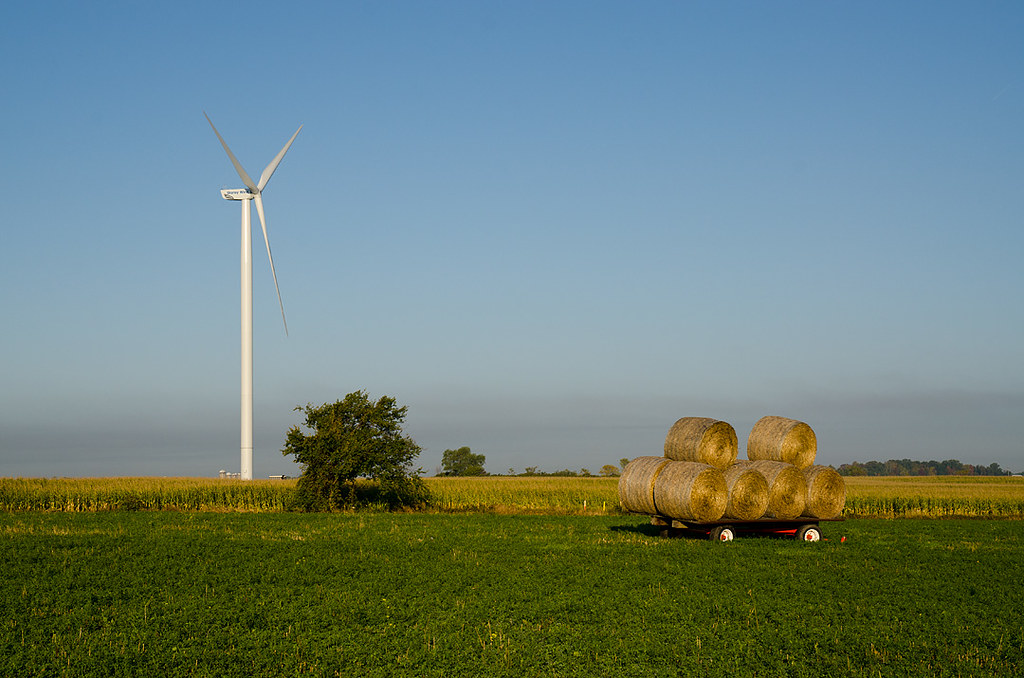
By Kelly House, Bridge Michigan
The Great Lakes News Collaborative includes Bridge Michigan; Circle of Blue; Great Lakes Now at Detroit Public Television; Michigan Public, Michigan’s NPR News Leader; and who work together to bring audiences news and information about the impact of climate change, pollution, and aging infrastructure on the Great Lakes and drinking water. This independent journalism is supported by the Charles Stewart Mott Foundation. Find all the work HERE.
- Michigan lawmakers left some priorities on the table when they passed a slew of clean-energy bills in the fall
- As lawmakers return in 2024, legislation awaits addressing community solar, energy reliability and political donations by utilities
- A divided legislature makes it unclear whether any of it will pass
Michigan entered 2024 with a host of new laws to transform how the state gets its electricity, from a mandate for 100-percent clean energy by 2040 to a new permitting system for large-scale wind and solar projects.
But the Legislature’s Democratic majority left plenty of energy policy ideas on the table as it rushed to pass legislation before year’s end, frustrating lawmakers and activists on both sides of the debate.
Republicans complained Democratic lawmakers hurried through clean energy legislation without addressing grid reliability issues that have plagued Michigan with power outages. Clean energy advocates complained the new laws catered to utility needs, while omitting policies that would help everyday Michiganders benefit from renewable energy.
As lawmakers return to work this month, they face pressure to continue debating energy issues that were excluded from last year’s package, including legislation to legalize community solar arrays and bolster Michigan’s power grid against outages.
But with a 54-54 split in the House setting up a likely voting stalemate, and lawmakers suffering from what one activist called an energy policy “hangover,” it’s unclear what might get done.
Here’s a look at key energy issues still awaiting action in Lansing:
Community solar
In a green energy debate that often seems intractably partisan, the concept of giving communities more ways to generate their own renewable power is a rare area of bipartisanship.
But it has also been a non-starter in Lansing, where it faces stiff opposition from utilities that are some of the state’s biggest political donors. Republican- and Democratically-sponsored bills to pave the way for so-called community solar have repeatedly failed.
The concept of community solar is this: Rather than purchasing rooftop solar panels (an expense that’s out of reach for many homeowners and virtually all renters) or waiting for their electric utility to deploy more renewable energy, a group of residents pools money into a small solar project, receiving credits on their electricity bills for the power it sends into the grid.
“It’s a fantastic way to reduce energy costs for neighborhoods,” said Justin Carpenter, director of policy for the Michigan Energy Innovation Business Council.
But for now, community solar is only a concept in Michigan, which lacks laws enabling approval for such developments.
Advocates say community solar has the potential to hasten Michigan’s energy transition and bring cheaper, more reliable electricity to more people. But utilities oppose it, arguing it would raise costs for their ratepayers.
Every household that generates its own power erodes the customer base for utilities, leaving fewer people to share the cost of maintaining power plants, poles and wires. It also cuts back on demand for utility-generated power, cutting into profit potential for utilities that receive a guaranteed return when they build power plants and solar arrays.
An early version of energy legislation developed last fall included language addressing community solar. But it was stripped out before the package went up for a vote.
Community solar has supporters and detractors on both sides of the aisle, said Jeff Wiggins, a spokesperson for Republican Senate Minority Leader Aric Nesbitt, and last fall’s energy reforms would have been a great opportunity to debate the issue.
“We were robbed of that debate,” by bill sponsors, Wiggins said.
But clean-energy advocates say they’re hoping lawmakers will take up community solar packages in both the Senate (Senate Bills 152 and 153, chiefly sponsored by Republican Ed McBroom and Democrat Jeff Irwin) and House (House Bill 4464 sponsored by Democrat Rachel Hood).
Those bills would establish rules allowing community solar developments in Michigan of up to 5 megawatts, or about 35 acres powering about 775 homes.
Peter Ternes, spokesperson for DTE Energy, the state’s largest utility, which opposes community solar, said enabling community solar would “have the opposite effect of its intended purpose,” allowing community solar subscribers to benefit while utility ratepayers “subsidize” their use of the energy grid.
Utility donations
Environmentalists and ratepayer advocates have long complained their energy priorities falter in Lansing because lawmakers are too eager to please utilities that donate to their campaigns.
In addition to community solar, utilities have successfully fought off legislation that would have ramped up penalties for extended power outages and eliminated a cap on the number of Michiganders who can receive utility payouts for the power their rooftop solar panels send into the grid. And their concerns about an overly-aggressive energy transition helped convince lawmakers to extend Michigan’s 100-percent clean energy deadline by five years, from 2035 to 2040.
“If we could curtail some of their political influence, I think that would be a boon for getting better climate and clean energy legislation through,” said Charlotte Jameson, chief policy officer for the Michigan Environmental Coalition.
Sixty-eight percent of sitting lawmakers have taken money from political action committees linked to DTE Energy and Consumers Energy, the state’s two largest utilities, according to a Bridge analysis last March, making utility interests among the state’s biggest political spenders.
Utility advocates say that as the industry with the greatest stake in Michigan’s energy transition, they have a right and duty to weigh in on political issues that affect them.
“We owe it to our customers and employees to support candidates for public office that help us meet our purpose of providing safe, reliable, affordable and clean energy for the 3 million plus residents and businesses we serve every day,” said Ternes of DTE.
But some in Lansing argue that campaign money tied to utilities shouldn’t be allowed.
Rep. Dylan Wegela (D-Garden City) announced plans in October to introduce legislation that would ban utilities from donating to political action committees, a move he equated to “buying influence with politicians.”
Wegela, who is among the farthest left-leaning members of his caucus, said he’s working to gather cosponsors for the bill and plans to introduce it in the coming months. He holds out little hope for its passage, he said, citing the very utility influence the bill aims to address.
“I think it’s really going to take the public demanding this,” he said.
Energy reliability
Citing persistent power outages despite the fact that Michigan has higher residential electricity rates than neighboring states, Michigan lawmakers last year launched a bipartisan task force to find ways to more consistently keep the lights on.
That led Democratic lawmakers to sponsor a bill package in October that aims to address several reliability concerns.
- House Bill 5216 would force utilities to deliver more reliable power by having state regulators set new reliability targets for utilities, along with incentives and penalties.
- HB 5218 would require utilities to submit monthly reports to state regulators on their supply and use of petroleum products such as crude oil and natural gas.
- HB 5220 would require state police to create resiliency hubs — places where the public can access shelter, power and other resources during extreme weather – in counties across the state, and would establish training protocols for first responders during extreme weather.
- HB 5221 would limit how much utilities can charge customers to reconnect their power after service was cut off due to nonpayment.
The package passed out of the House Energy, Communications and Technology Committee shortly before lawmakers broke for the year. But it’s not clear whether that momentum will continue into 2024.
House Democratic spokesperson Amber McCann noted there is a struggle to pass policy of any kind while the House remains evenly split between Republicans and Democrats.
House Minority Leader Matt Hall, R- Richland Township, so far has “rejected policy-related discussions” with Democratic leaders, McCann told Bridge.
Republicans, meanwhile, complain they share a concern about Michigan’s unreliable energy grid, but Democrats have left them out of the loop on policy discussions.
Calling the Democratic reliability package “a vague laundry list” that has “no real teeth,” Hall spokesperson Jeremiah Ward said House Republican leaders don’t support the legislation but are open to negotiations.
Catch more news at Great Lakes Now:
Supreme Court poop dispute could have big impact on Michigan environment
Group launches campaign to overturn Michigan solar siting law
Featured image: Shirley Wind Farm in Green Bay, Wisc. (Photo Credit: U.S. Department of Energy)




